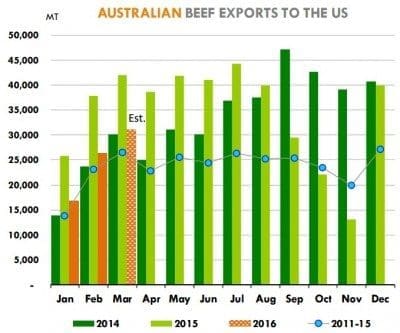IMPORTED beef prices for lean grinding meat into the US continued to retract sharply last week, reaching a 20-month low on limited end-user interest, currency movement and higher offerings out of New Zealand.
The imported 90CL manufacturing beef indicator price was quoted on Thursday at A544c/kg, another A29c/kg lower than the week before, and a worrying 83c/kg or 13pc below where it sat this time a month ago.
The market is now at a low-point not seen since July 2014, in A$ terms. All of the price gains made in the early stages this year have now been washed-away by the combination of a surging A$ and lacklustre US end-user demand.
In US$ terms, 90CL imported prices last week dropped a further US8.5c, to US187¢/lb CIF.
Last week’s imported beef report from the Steiner Consulting noted lower prices for trimmings and some whole muscle cuts, from the lean through to the fattier end of the spectrum.
There were a few main features emerging in the market over the last week that pulled imported beef prices down, Steiner suggested:
- First was the seasonal jump in the NZ cow kill, which was estimated to be about 40,000 head per week through mid-March and will likely peak at around 50,000 head per week in May. This will result in a much larger amount of lean beef on the market over the next two months.
- Second, the drop in US cattle futures, which suggests finished cattle will be cheaper, allowing US domestic packers to offer beef at lower rates.
- Third, the ongoing discount that pork and poultry are being sold for, relative to beef – recent wholesale beef price increases put pressure on margins that end-users appear to be unable to maintain.
- The USDA Cold Storage report for February, which appears more positive for beef prices moving into the US summer, was also recently released.
Steiner reported that US end-users were looking to get out of the way of a slumping cattle futures market and the (expected) collapse in the value of fat pork trimmings.
Imported beef offerings also appeared to have increased to a certain extent, with more NZ and Central American beef now being shown. Higher offerings from NZ should not be a surprise at this time of year, however. By the end of February NZ cow slaughter was reported at a little over 30,000 head, double what it was in early February.
“We think NZ weekly cow slaughter is now around 38,000 head and it should be around 50,000 head by mid-May,” Steiner said.
The seasonal increase in availability at a time when US end-users are looking to stay short-bought had certainly put some pressure on prices in the short-term.
There was some speculation that the February decline in boneless beef in US cold storage should be supportive of imported beef values going into the northern hemisphere spring, Steiner said. Total inventories at the end of February were 204,000t, down about 12,000t from December.
US cow slaughter had been running modestly above year-ago levels in the first couple of weeks of March, but Steiner expects slaughter to drift lower in April and May. US pasture conditions are generally positive and even with the recent decline in calf prices the profit outlook for 2015 remains quite positive.
Australian beef shipments to the US continue to track well below the levels seen last year and March shipments are likely to be under 2014, estimated by Steiner be around 27,000t, 36pc lower than a year ago and about 10pc lower than in March 2014.
Sharply higher cattle prices in Australia and a strengthening in the value of the A$ have negatively impacted the Australian beef export outlook. It takes about US75c to buy A$1 at this time, compared to US68c in mid-January, a 10pc appreciation.

